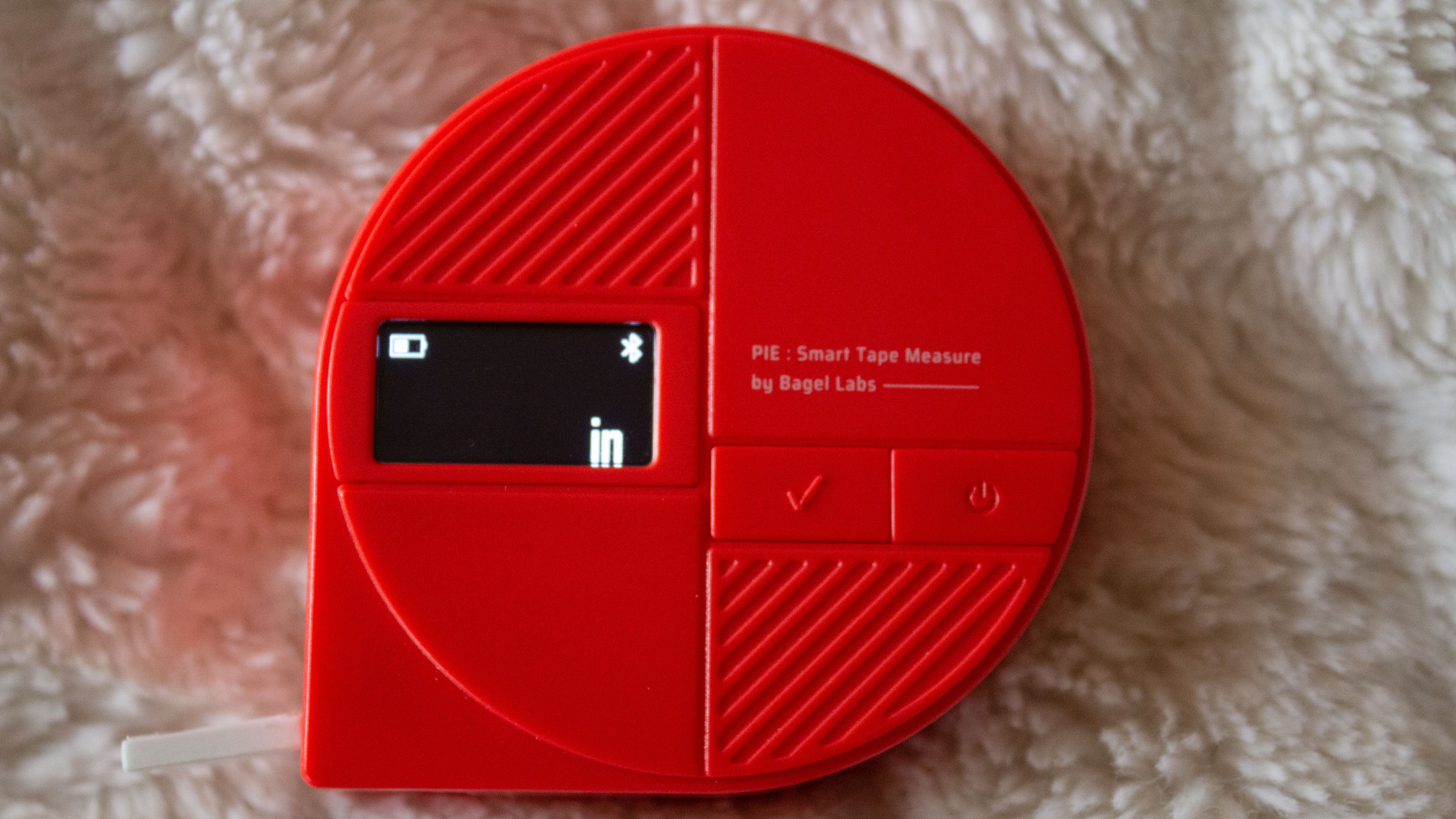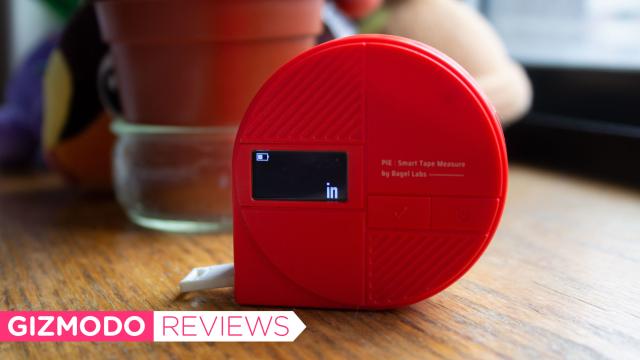There are plenty of bad connected gadgets, but sometimes it’s not the device itself that’s bad—it’s the execution. The idea of using a connected tape measure to track your fitness goals is not a bad idea. But considering the dangers of body dysmorphia and various types of eating disorders, it’s a gadget that needs to be designed with sensitivity. Pie by Bagel Labs, a smart tape measure, is an example of a device you could make, but perhaps shouldn’t.
Pie is the fitness version of Bagel Labs’ more general-purpose Bagel digital tape measure (which you might remember from its successful Kickstarter). It has many of the same features, too, including a one-click save and a mobile app. But Pie is much simpler. There are no lasers, strings, or wheels for measuring—it’s just a regular tape with a Bluetooth component and a digital screen. Also absent are the voice memos, though that’s less helpful from a fitness context anyway.

Pie by Bagel Labs
What is it?
Smart tape measure for fitness
Price
$US80 ($139)
Like
Easier to record results than manual. Can switch between measurement units easily.
No Like
Too expensive for what it is. App isn't great.
In the grand scheme of fitness goals, measuring progress can be tricky. The number on a regular old scale doesn’t account for the actual composition of your body. You could gain weight, but you would have no way of knowing if that weight is muscle, fat, or water. Body mass index (BMI) is equally opaque as a metric of health. Someone like The Rock would be considered obese by his BMI, and Vin Diesel would be overweight. Those are extreme examples, but still worth noting.
So a tape measure is actually quite handy, because if you have the patience, you can track where you are making progress. The only issue is that measuring yourself by hand often requires you to record data manually and then look up various formulas for calculating body fat.
That’s why a pitch for a smart tape measure that automatically records your measurements for you and calculates your progress sounds like a convenient tool. In theory. The reality is a bit different.
[referenced url=” thumb=” title=” excerpt=”]
I tested Pie against my dumb body tape measure, the MyoTape, and my smart scale. I got similar results from the MyoTape and Pie, though Pie’s measurements were more precise due to the digital aspect—I didn’t have to try and remember what each little mark on the analogue tape was an eighth or a sixteenth of an inch. I also liked that if you hold down the check mark button, you can switch between millimetres, centimeters, and inches. That said, the MyoTape was much easier to take measurements with one-handed for areas like my biceps, bust, and waist. The Pie has a hook to make it easier to measure yourself, but I found it finicky and sometimes it would snap out of place.
Recording my results were sort of mixed. The first time I tried out Pie, Bluetooth just did not cooperate for me. I had to unpair, re-pair, and then unpair and re-pair again before the Pie began sending measurements to the app. I didn’t have issues after the first time, but I have never problems manually recording my measurements. I also didn’t love the Pie Fit app’s interface. To record measurements, you tap on a specific body area—say, your left thigh—then measure yourself and hit the check-mark button. That part was fine, but if you forgot to tap a new area, then you could easily overwrite the measurements you just took. You can edit the mistake, but it involves navigating through a few menus first. Some may find that a mere quibble, but the whole point of digitising a tape measure is to make recording easier than manual. Not finicky.
But interface aside, the thing that concerns me about the Pie Fit app is how some features may promote an unhealthy approach to tracking progress. For starters, the app emphasises setting goals. There’s nothing wrong with that—it’s how the app handles it. The Pie Fit app said my body fat percentage means I’m obese. I gained a ton a few years ago due to undiagnosed polycystic ovary syndrome, but I’ve since worked with my physician to get myself back to a healthy weight for me with diet and exercise. Actually, I’m the fittest I’ve ever been in my life. Is there room for improvement? Sure! I’d love to be shredded like Gal Gadot. Am I obese? According to my doctor, not at all. I find it troublesome that the only “solution” to my “obesity” the app presents is to set a goal of reducing my waist size. This is doubly confusing when the app also says my waist-to-hip ratio is already in a healthy range. I trust my doctor over an app, but I can see how someone else might feel confused.
Also, even if I wanted to lose weight, setting weekly or biweekly goals to reduce my waist size seems a questionable way to achieve that—especially because being healthy and strong is a better goal than being “thin.” It’s also a surefire way to discourage people when they inevitably fail to lose an inch from their waist in a short period of time. And it’s concerning that the app has a graph where you can check your daily changes in measurements, which are largely meaningless. It takes weeks to change your body’s composition, and it feels potentially irresponsible to encourage measuring more than once every four weeks.
The app also didn’t give any further information as to how it arrived at my 34.9 per cent body fat calculation. I’ve manually tracked my body measurements for months, and using a body fat calculator, have remained pretty static at 27 per cent. I also use a smart scale, which puts me at around 29-30 per cent. Smart scales are imperfect, because they rely on bioimpedance signals that run through your legs and measure resistance but don’t necessarily account for your whole body. But the most accurate methods—like underwater weight testing and Bod Pods, which measure body fat via changes in air pressure—are not easily accessible and can be expensive. At least smart scales account for muscle, bone mass, and water. It’s unclear what criteria, formula, or method Pie uses to calculate body fat. Body composition is nuanced and complex. This app doesn’t help you demystify that at all.
This may not be a huge issue to an informed user or someone simply looking for an easier way to record their measurements. But even in terms of exporting data, you can only do so to Apple Health, according to Bagel Labs’ FAQ. That’s extremely limiting to Android users and iOS users who may prefer a different platform. Also, it seems overly focused on weight loss—not everyone investing in a body measuring tape is looking to lose weight. Some want to build muscle! Technically, you can set goals to increase the size of certain body parts, but there isn’t really a set of options for folks looking to increase muscle mass.
It’s not that I think the Pie is 100 per cent evil. The physical product itself is well-made, though I find it a bit one-note. I’d be happier if I could use it as a regular tape measure. In the age of social distancing, I couldn’t even use this to measure six feet of distance around my apartment, because it taps out at 59 inches—just shy of five feet.
The final kicker is that the Pie costs $US80 ($139). My MyoTape, which basically does the same thing, usually costs $US4 ($7)-$US6 ($10) on Amazon. You could argue that I’m paying for the app, but few apps, if any, are worth $US80 ($139)—let alone one as problematic as Pie’s. And if you only use a tape measure once a month, as many experts recommend, it’s hard to justify spending $US80 ($139) for dubious convenience.
Pie is a case of a decently made product with an absurdly high price tag, considering what you’re actually getting. And I don’t think anyone diagnosed with or prone to developing body dysmorphia should use this product at all. A smart tape measure that can measure all sorts of things is a great idea with a lot of utility. But one that’s solely for fitness? You’re better off putting that $US80 ($139) toward fitness classes, an on-demand workout app, or a cheap fitness tracker.
README:
-
$US80 ($139) is too much for a smart tape measure that’s only meant for your body.
-
The physical product is well-made and works fine.
-
The app, while simple, leaves much to be desired.
-
Don’t get this if you have body dysmorphia.
